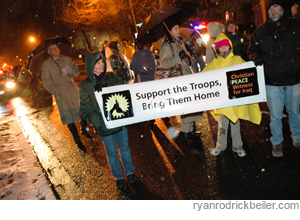 A comment on my recent blog about The Hurt Locker really got my blood boiling. Fortunately, after having a good chat with another combat veteran, I realized that my frustration was not really with that particular comment, but the fundamental sentiment upon which it logically relies. So I figured it might be important to clarify for God's Politics readers something that too often flies under our radar in social justice circles.
A comment on my recent blog about The Hurt Locker really got my blood boiling. Fortunately, after having a good chat with another combat veteran, I realized that my frustration was not really with that particular comment, but the fundamental sentiment upon which it logically relies. So I figured it might be important to clarify for God's Politics readers something that too often flies under our radar in social justice circles.
Progressives come in different shapes and sizes, and we can be as militant and visceral as our ideological opponents. In regards to my attempt to exercise my right to refuse to bear arms in 2006, some might rejoice in the fact that I made a deliberate stand for nonviolence, shove a soapbox my way, and expect me to lead the charge on Capitol Hill. Others, like the commenter on my last blog entry, question quite viscerally why it took me so long or why I even enlisted in the first place. Trust me, I ask myself the same question. In fact, my inability to answer it provides me no shortage of personal turmoil.
In October 2004, I was in Sammarah, Iraq, in Operation Baton Rouge. A day or so into the engagement, we occupied a small hospital, not too unlike the one I visited with Shane in Rutbah. Late at night, I walked through the corridors with my platoon sergeant and a doctor from the hospital, showing us places we could sleep overnight. In each room, coagulated, pooled, and dried blood was all over the tile floor. All I kept thinking to myself was "Is this the doctor's way of inviting us to sleep in the proverbial bed we've made?"
Occasionally, we get so caught up in social justice, we forget that we sometimes make the same mistakes of the very people we find ourselves up against; we dehumanize people, sometimes even those who share our values at a different intensity. We say, "look, you made your bed, you enlisted and participated in an illegal occupation." But that's not the whole story. To build off the analogy, I didn't make the bed; I was stupid enough to drink some very enticing, college-money-flavored Kool-Aid and I passed out there. To top it off, I get held accountable for making the bed in the first place (as if I arranged the military-industrial-complex bedroom décor).
Don't get me wrong; I'm certainly not innocent -- in fact, less so than others. I drank the Kool-Aid of my own volition. But I should not (nor should other service members and veterans) be used as a scapegoat for our collective inability to stop the wars that, as members of a democracy, are conducted in our names and with our hard-earned cash. I hate to be the bearer of bad news, but those bombs and bullets took flight by the power of each of our tax dollars and the votes we cast for the officials who authorized their use. To believe that soldiers should bear the brunt of the guilt for sending themselves to unjust wars that often cause them severe moral injury simply boggles the mind.
My point is that nobody is purely innocent. We all share in the responsibility to change a situation we believe to be unjust. If you want to remake the bed, as I do, then it takes all of us working together, without excluding those you might feel share a greater burden of guilt. That is precisely why the Truth Commission on Conscience in War is so important and (one of the reasons) why I deliberately drew the parallel in my last post. Consider attending the public hearing this weekend at the Riverside Church in New York City. If you cannot make it, follow Centurion's Guild on Twitter as we live blog the testimony this Sunday evening.
 Logan Laituri is an Army veteran with combatant service in Iraq during OIF II and experience with Christian Peacemaker Teams in Israel and the West Bank. He blogs sporadically and is a co-founder of Centurion's Guild.
Logan Laituri is an Army veteran with combatant service in Iraq during OIF II and experience with Christian Peacemaker Teams in Israel and the West Bank. He blogs sporadically and is a co-founder of Centurion's Guild.
Got something to say about what you're reading? We value your feedback!